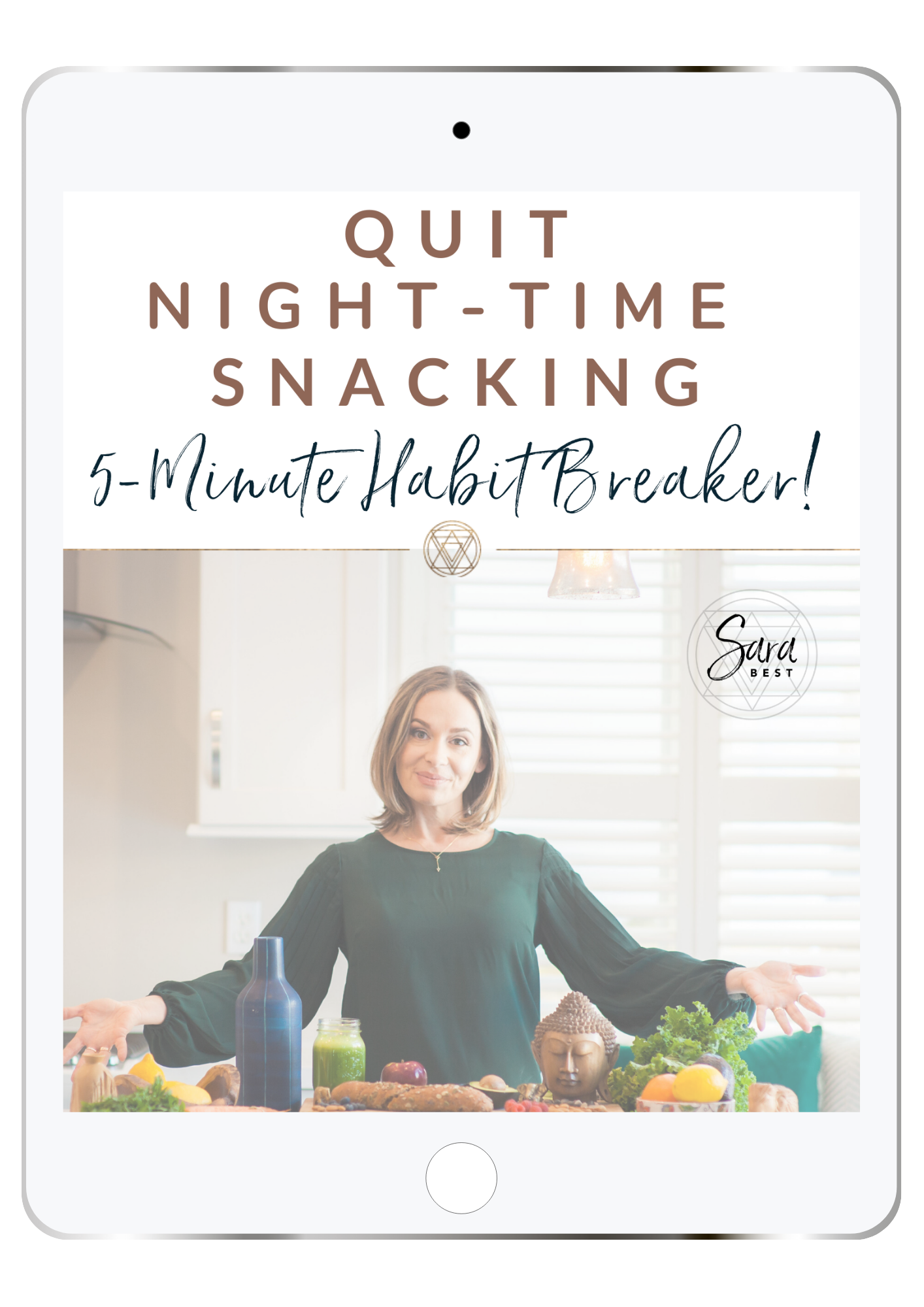
You might be reading this at a different time, but I’m writing this at the beginning of December and already there’s a lot of talk about New Year’s resolutions. Now, I don’t know you, but my guess is that when you hear the words “New Year’s resolutions,” your heart sinks, your stomach flips, and you’re thinking, “Nope, never again”.
In fact, I was in my Conquer The Food Fight group (if you’re not already a member of my free group, come join us by clicking here!) a little while ago asking everyone’s opinion about New Year’s resolutions. And most of them said that their resolution is to never again make another New Year’s resolution. And boy do I get it. Because what we know is that the vast majority of New Year’s resolutions don’t work.
The truth is that, depending on what research you read, between 85-90% of people who make New Year’s resolutions fall off the wagon before the end of January.
Not great statistics! I’m betting that you have personal experience to back this up and I certainly do as well. We’re DONE with resolutions. But, I think it’s important that we don’t throw the baby out with the bathwater because you know that New Year’s resolutions don’t work but you still want to make better choices in the coming year, right?
That’s the part of New Year’s resolutions that are appealing to us because they speak to our desire for long term change. 2020 is a monumental year. It represents not only a new year but a whole new decade! And we all want for 2020 to be THE year that we finally end our fight with food. The year that we finally lose the weight, or overcome chronic health issues, or improve our health in general so we can feel better, have more energy, sleep better, or whatever your particular goals are. We would all love for 2020 to be the year that THAT happens for us. We would love for 2020 to be the year the switch flipped. The year that we finally stepped into becoming the person that we want to become.
Wouldn’t you love that?
And so even though we know they don’t work, even though we’ve tried them so many times and failed, there’s still something appealing to the idea of making that commitment, of setting that intention, and of hopefully seeing it through this time.
It’s only natural!
As somebody who focuses on how the human brain works, how behaviors change, and how we make and break habits, I’m going to tell you why New Year’s resolutions don’t work. But I also want to share with you a different way of approaching those habit changes that you want to make. What I call my “three S’s” for making long term change happen. And that’s what you can focus on this year instead of the old New Year’s resolutions (that never work anyway).
Why New Year’s resolutions don’t work.
There are many excellent reasons why New Year’s resolutions don’t work that have to do with basic human psychology or basic human wiring. I’m going to share just a couple with you.
They Rely on Willpower
The first is that they typically rely only on willpower to fuel them. You make a resolution, you set it off into the world, and its entire fuel source is willpower. You say, “I’m going to stop eating sugar. I’m going to stop snacking at night. I’m going to go to the gym five days a week. I’m going to take up yoga. I’m going to run a marathon.” Maybe you write it down or maybe you even share it on Facebook. And then you hope that willpower will help you make it a reality.
But, what we know about willpower is that it is a very poor fuel source. It can help you every now and then, and sometimes we do have to call on it, but it is fleeting. It ebbs and flows throughout the day and it’s often lacking when you need it most.
Willpower is highly impacted by your external environment and your internal climate.
I think we’ve all experienced the phenomenon that psychologists call “decision fatigue,” which is another way of saying “willpower fatigue.” This is what happens when you have great intentions at the beginning of the day: “I’m not going to binge at night”. Or when you have dinner plans this evening: “I’m going to make really good choices when I look at the menu”.
You have great intentions in the morning because that’s when your “willpower bank account” is full. But as you go through the day you make lots of decisions. And you use willpower for all of them. You use willpower to not scream at your boss, or not rear end the driver that just cut you off, or to not order the donut when you get your coffee. Every time you make one of those decisions, you exercise a little bit of willpower, and that willpower bank account quickly starts to deplete. It was full in the morning but now it’s going down. So when you get to the evening there’s nothing left and when there are cookies in the cupboard or ice cream in the freezer there’s no willpower left to keep you on track with your resolution.
We’ve all experienced this.
And this all happens even more quickly depending on how much stress you’re under, how much sleep you’ve had, what’s going on around you and what kind of triggers you’re exposed to.
Willpower is not a dependable resource and the fact that almost all New Year’s resolutions rely on willpower to work is obviously part of the reason that they set us up for failure. It’s programmed into them to not work because they’re relying on a fuel source that is not dependable.
So that’s the first reason that New Year’s resolutions don’t work – they’re relying on willpower.
They Require Deprivation
Another reason they don’t work is that the old New Year’s resolution model is typically based on deprivation. They usually sound something like: “I’m not going to eat sugar anymore. I’m not going to eat carbs. I’m not going to relax on the couch at night, instead I’m going to go to the gym.” You’re depriving yourself either of the foods you want to eat or the way you want to spend your leisure time. It’s all based on deprivation.
Deprivation is the worst way you can approach habit change because your brain – the brain of all animals actually – is hardwired to avoid pain and seek pleasure. It’s hardwired in you. You’re not going to change that. Again, you can try to overcome this natural wiring with willpower but, as we already discussed, that’s not going to be enough. Your brain is not programmed to embrace deprivation. You can do it for a little while but you’re going to ultimately lose that battle.
The only way to get your brain on-side with healthy changes long-term is to rewire the old thought patterns and present the healthy choices as a form of reward (a process that we talk about extensively inside my Change Your Brain – Change Your Body program)
Using willpower and trying to deprive yourself of things is the model that traditional New Year’s resolutions are built on and that makes them destined to fail. We’ve all experienced this over and over and over again.
Willpower and deprivation are only a couple of the main reasons why the old model of New Year’s resolutions doesn’t work. And so, this year I’m encouraging you to opt-out. Don’t make New Year’s resolutions. We know they don’t work. Don’t set yourself up for failure. Now you understand why that that model doesn’t work and you’re not going to fall into that trap again.
However, that doesn’t mean that you don’t still want to change your old habits, create new behaviors and make 2020 the year you truly create a new, healthier lifestyle for yourself. You just have to come at it from a different angle. You have to embrace a different approach.
It’s time to decide that you are done with the old way of trying to create healthy habits. No more deprivation, no more relying on willpower, no more beating yourself up for failing!
You do want to make behavior change. You do want to create new habits. You do want to lean into a new lifestyle that is going to fuel the person you want to become. You want to be healthy. You want to have energy. You want to live a long, healthy, vibrant life.
And to do that, you do have to change some of your behaviors, but instead of making New Year’s resolutions, I want to share with you what I call the three S’s.
The 3 S’s for successful behavior change
Again, I’m going to simplify things here. Obviously there’s so much work and research out there about how habits are changed and how we make long term behavior changes but I want to simplify it for you so that you have something really digestible that you can use right away.
The 3 S’s are going to help you work with the way you’re brain is naturally wired so that you’re setting yourself up for success rather than failure.
Be Specific
Normally our New Year’s resolutions are “I’m going to eat less sugar” or “I’m going to work out more” or “I’m going to resist carbs.” In other words, they are very vague. What does “resist carbs” even mean? Almost all foods have carbohydrates in them. What are you going to eat? What are you not going to eat? Or ‘I’m not going to eat sugar’. Okay, but how do you define sugar? It’s a very complicated question these days. Again, what will you eat? What will you not eat? What will be acceptable? Will you never eat sugar? Will you sometimes eat sugar?
These kinds of resolutions are very vague and your brain doesn’t work that way. It’s not helpful. You need to be specific about a plan for exactly what you’re going to do and exactly what you’re not going to do. So maybe you’re not going to add processed white sugar to your food. Or eat foods that have sugar in the list of ingredients. But maybe things like fruits you’re going to eat. I don’t want to get into the whole sugar debate here, I just want to offer you an example about being specific.
If you want to exercise don’t just say you’re going to exercise more. What are you going to do? And I mean be super-specific. Don’t just say “I’m going to exercise five days a week”. That’s still very vague. Which five days? What time of day? What kind of exercise will you do? For how long will you do it? Where will you do it? How will you get there? Be specific.
You need to have a specific plan because otherwise what you’re doing is relying on willpower. You’re relying on hoping you make a good choice of what it’s time to go to the gym. But if you make a specific plan, something like: at 6:00 AM on Monday, Wednesday and Thursday I’m going to wake up, I’m going to put on these specific clothes, I’m going to get in the car, I’m going to drive to the gym, I’m going to go on the treadmill for 30 minutes at 7.5 mph and then I’m going to drive home. That is a specific plan. You’re still going to need a little willpower to get yourself going but for the most part, you can just execute the plan – far less willpower required!
Think Small
Too often when we make resolutions or embark on any kind of behavior change we think too big. Again things like “I’m going to give up sugar, I’m going to work out five days a week. I’m going to run a marathon”. These are big, big, big things. And it’s not that these aren’t good goals, but they’re too big to start. You need to break them down.
Running a marathon is a great goal but you need to break that down and think small. What’s the first step you’d need to take? Well, if you’re not running at all right now, you probably need to start running 15 minutes a day or 10 minutes a day.
So think small and break it down. I’m always encouraging my clients and my students to embrace baby steps. There is so much power in baby steps if they’re made consistently. Plus baby steps work really well for the way your brain is wired.
Remember that your brain is wired to avoid discomfort, avoid pain, like pulling your hand away from a hot stove. You’re just hardwired to do that. And big change feels scary and uncomfortable. You’re always going to have some discomfort when you’re making a change. You need that. If you’re only choosing to be comfortable you’re just staying where you are. But the smaller the discomfort, the smaller the step, the more likely your brain is going to be to get onboard.
So running for 10 minutes feels less terrifying than I’m training for a marathon. Work with the way your brain is wired and break down your goals into baby steps and be okay with that. Embrace baby steps. Don’t be ashamed of baby steps. Don’t be embarrassed by your baby steps. Other people can be creating all kinds of great and lofty goals and that’s lovely for them and we all hope it works out. But I am telling you that based on scientific research, baby steps are more powerful in the long run.
For example, if you’re trying to get rid of sugar in your diet, maybe your first baby step is: I’m going to go from three teaspoons of sugar in my coffee every morning to two. And that’s it. That’s your first commitment to yourself, going from three teaspoons of sugar to two and doing that for a week to start. That’s perfect. That’s specific and it’s small. Not to mention it’s totally doable without deprivation or willpower. And after seven days when you’ve done two teaspoons of sugar instead of three, that’s a huge win! And then you can take another baby step to build on that.
And that’s how you start building new, healthier habits. You create small wins for yourself, you do it in a way that sets you up for success, and then you build.
Be Smart
When I say smart I mean working with your brain (rather than against it). So when you think of the third S ‘be smart’ think of working with the way your brain is naturally wired.
So much of health and wellness and dieting advice I see out there has us trying to work against the way our brain is naturally wired and that is a battle you are always going to lose. We all underestimate the power that our brain has over us. That old part of your brain, that prehistoric “reptilian” part of your brain, the limbic system is really driving most of your behaviors. And when you try to create habit change in a way that goes against how that part of your brain is wired it’s not going to work. You are going to fail. And that’s what we’ve all experienced again and again.
We’re trying to do things through deprivation and making big lofty goals. We’re not being specific or going in with a specific plan and we’re beating ourselves up when we fail. All of these things that you do work against the way your brain is naturally wired. And that’s why you keep falling into this trap of sabotaging yourself, of taking one step forward and three steps back. It’s so frustrating.
Instead, I want you to start working with the way your brain is wired. When you learn about how your brain is naturally wired and you start introducing behavior change in a way that works with that, you and your brain are working on the same page and you start seeing results.
Try a new approach in 2020
If you’re really ready for a new approach in 2020 – one where you start working with the way your brain is naturally wired, rather than against it, then join me for a FREE 5-day challenge I’m hosting in January that will teach you how to get started with reprogramming your old eating habits and cravings. HERE’S THE LINK to learn more and get your name on the list to be part of it.




